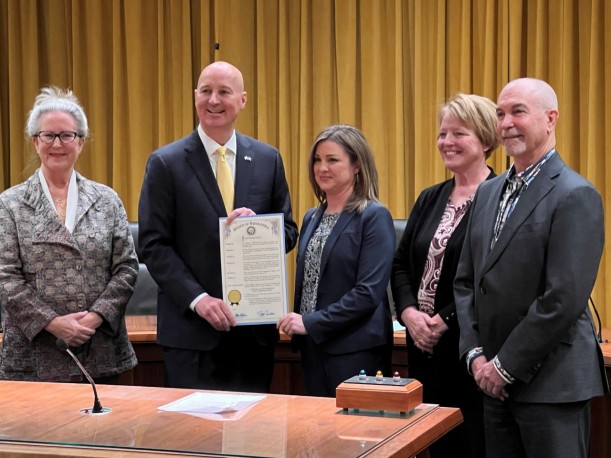Court Reporter Week Puts Spotlight on Unique Profession

Gov. Pete Ricketts and members of the Nebraska Court Reporters Association, from left, Gretchen Thomas, Stefanie Allison, Cynthia Craig and John Thomas celebrate National Court Reporting and Captioning Week at a ceremony at the Capitol on Monday, Feb. 7, 2022. (Adam Astley/NeCRA)
Nebraska Gov. Pete Ricketts recognized last week as National Court Reporting and Captioning Week during a ceremony at the Nebraska State Capitol.
“Court reporters and captioners translate the spoken word into text and preserve our history,” Ricketts said, reading from a gubernatorial proclamation. “(They) are truly guardians of the record.”
Now in its 10th year, the weeklong event sponsored by the National Court Reporters Association is designed to highlight the importance of stenographers both inside and outside a courtroom.
“These professionals operate in the background, usually without being noticed, but their role is vital nonetheless,” court reporter Stefanie Allison said during the proclamation ceremony. “The goal of Court Reporting and Captioning Week is to educate and engage the public so that they can better understand this important work.”
Court reporters rely on the latest in technology to use stenographic machines to capture the spoken word and translate it into written text in real time.
“They personally bear witness to court proceedings and are solely responsible for ensuring that the record is true and accurate,” said Allison, who has worked for 13 years as an official court reporter of the Nebraska Judicial Branch.
At a town hall hosted by the Omaha Bar Association last year, district, county and state Supreme Court judges, prosecutors and public defenders, and court reporters were in agreement that having a stenographer in the courtroom is the best way to ensure an accurate record.
NCRA President Debra Dibble, a freelance court reporter from Salt Lake City, said in a news release that a “stenographic record is the gold standard for capturing the record.”
Freelance court reporter Joslyn Cummings, who moved to Omaha in October, recently earned her national Registered Professional Reporter certification from the NCRA.
“I think it tells the attorneys that are working with you that, yes, this court reporter has this level of competency, they can be confident that they’re going to get a good, accurate, complete record,” Cummings said in an interview with The Daily Record.
To receive her RPR, Cummings had to prove her skills were up to the task by typing 225 words per minute or more. Certification also requires a score of 70% or higher on a 120 question multiple choice test that covers a variety of topics, such as best practices, professionalism and ethics.
In addition to a national certification, some states also require court reporters to receive additional certification. Nebraska does not require certification to be a court reporter, while Iowa does have a Certified Shorthand Reporter certification, for which Cummings is currently studying.
There are a lot of reasons for someone to become a court reporter, including a good salary and flexible schedule, but Cummings enjoys the job for another reason: curiosity.
“One of my most favorite things about it is that I think I’m just a perpetual learner,” Cummings said. “I’m happiest if I can say, at the end of today, ‘I learned something and I know something I didn’t know yesterday.’”
Captioners are also vital to the public by providing live captioning of events, and they assisting members of the Deaf and hard-of-hearing communities with gaining access to information, entertainment and educational opportunities.
For more information about court reporting, visit the National Court Reporting Association at ncra.org or the Nebraska chapter at necra.us.
User login
Omaha Daily Record
The Daily Record
222 South 72nd Street, Suite 302
Omaha, Nebraska
68114
United States
Tele (402) 345-1303
Fax (402) 345-2351




